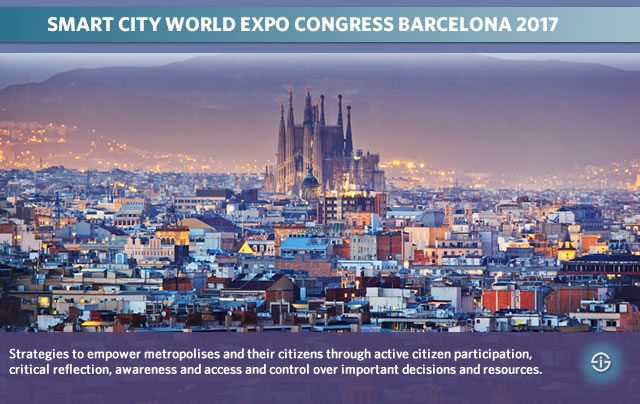From November 14 to 16 it’s again all smart cities in Barcelona at the occasion of the 2017 edition of Smart City Expo World Congress where people empowerment, active citizen participation and even participative democracy are omnipresent.
The theme of Smart City Expo World Congress 2016 already went in that direction with ‘Cities for Citizens, Citizens Changing Cities’. It was partially about citizen-centricity and the key role of citizen participation and empowerment too whereby the smart cities narrative went beyond technologies such as IoT and big data and even beyond smart city applications, from the role in the city of smart buildings to smart transport systems and smart ways to address issues from housing and mobility to ecological issues.
The event wanted to focus on the core questions, challenges and outcomes, whereby Jeremy Hultin spoke about ‘the second act of the smart city play‘.
However, Smart City Expo World Congress 2017 goes several steps further and is organized under the theme ‘Empower Cities, Empower People’. Citizen engagement, citizen participation and people empowerment are main parts of that theme.

Smart cities need informed, aware and empowered citizens with active citizen participation
As reported in our article on smart city best practices, the ‘Smart City Playbook’ which Machine Research made for Nokia, emphasizes citizen engagement as one of six best practices whereby the benefits of smart initiatives should also be visible to citizens who need to be involved.
Yet, why not take it even a step further? Our recent article on the future of smart cities calls for a holistic approach whereby the right challenges are tackled: ecology, the circular economy and people, in their capacity as citizens, tourists and so forth, in an ecosystem view to start with because smart technologies and smart cities are not guarantees for smart decisions, especially if taken by the few at the top.
And let’s take it yet another step further and rethink the way cities are governed and how citizens get involved. Several events in 2017 have once more showed how groups of citizens keep being ignored or excluded. A smart city isn’t smart if it isn’t inclusive and doesn’t take into account active citizen participation whereby citizens are clearly informed and key decisions get debated.
With the theme ‘Empower Cities, Empower People’, Smart City Expo World 2017 wants to, quote, focus on strategies to empower metropolises and their citizens through active citizen participation, critical reflection, awareness and access and control over important decisions and resources.
That is a totally different story than the one we often hear and see in other cities that are at the top of those many smart city rankings that are published every now and then.
Smart cities and the end of top-down governance
The director of the event makes crystal clear what the role of the citizen should be in the smart city of the future in the event’s press release: “We believe that the role that citizens will play in the near futures will be crucial. Top-down governance approaches are gone for good and we need to shift the relation between city governments and residents taking it one step further. Never before in history has there been so much talent and creativity concentrated in so little space.”
You read that read: top-down governance approaches are gone for good. It’s something that in most cities is far from a fact and essentially boils down to active citizen participation and even a degree of participative democracy.
One could imagine there is a political statement behind it, given the event takes place in Catalonia of which Barcelona is the capital. Barcelona is not just the richest city of the region but of the whole of Spain.

The organizer of Smart City Expo World, Fira de Barcelona, is also the organizer of Barcelona’s Industry Week 2017 of which the IoT Solutions World Congress is part and of dozens of other events, making it a major contributor to the economy of Barcelona and the region.
Barcelona is also home to many other events. Only a week before Smart City Expo World Congress 2017, for instance (5-9 November), Gartner organized another edition of its European Gartner Symposium/ITxpo 2017, bringing over 6,000 CIOs and senior IT execs to the city.
Smart city Barcelona: the role and state of the economy
The GDP of the greater Barcelona metropolitan area makes the city the fourth most economical powerful of the EU, Wikipedia says.
Where are we going with this? Well, in order to fund smart city projects and in order to make sure people live well, you need a thriving economy and investments. Add the mentioned critical reflection, awareness and access and control over important decisions and resources and you know what we mean.
The Barcelona region and Catalonia have such a thriving economy and industry. Moreover, they attract a lot of foreign investments. Yet, what is the first criterium for foreign investors? Stability, also on the political front.
This isn’t an expression of an opinion about the Catalonian question by the way. It’s a proven reality that is documented by so many reports. People have a right to know that when taking decisions and the voices of all should be heard. The Catalonian region has always been at the top of attracting foreign investments, in recent years mainly from countries in the Middle East. Barcelona is not just a smart city leader but also an economic leader.
The role of citizens and their voices are indeed crucial and so are the ways we govern. Only a week before the event, Barcelona’s mayor called for real democracy and criticized the way Carles Puigdemont had pushed his agenda and brought the region in a problematic situation, among others on an economic level.
Revisiting smart cities: Barcelona’s path to a participative democracy
And, although this isn’t a judgement either, in a sense the theme of Smart City Expo World 2017 is where it calls for the crucial role of citizens and even a citizen-oriented form of participative democracy.
Because that is exactly the goal of Barcelona’s mayor Ada Colau and the mission of Barcelona’s chief technology officer and digital commissioner Francesca Bria as you can read in this excellent article on the website of the Financial Times.
Rethinking smart cities in terms of what they can do for people and how people can be more involved and participate in ways that fit better with the far more open, innovative, collaborative and informed ways of leading and living whereby top-down approaches, dictates, political agendas and silos should disappear to succeed in true (digital) transformation of cities and beyond.
And always with those same words after it: critical reflection, awareness and access and control over important decisions and resources.
If that citizen-focused approach is what fits with your smart city views do keep an eye on what is going on in beautiful smart city Barcelona the next few years, beyond Smart City Expo World Congress 2017.
Top image: Shutterstock – Copyright: Kanuman – all other images property of their mentioned owners

